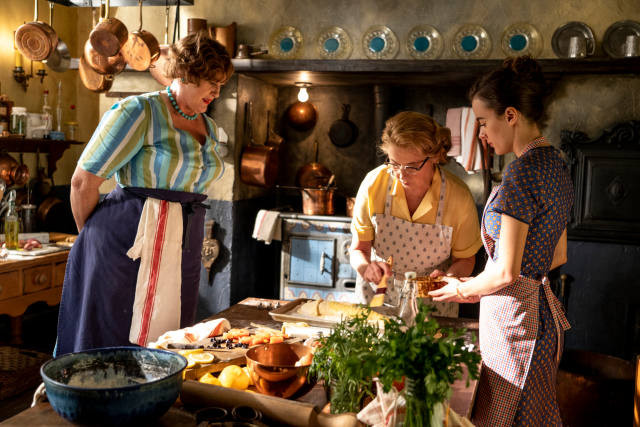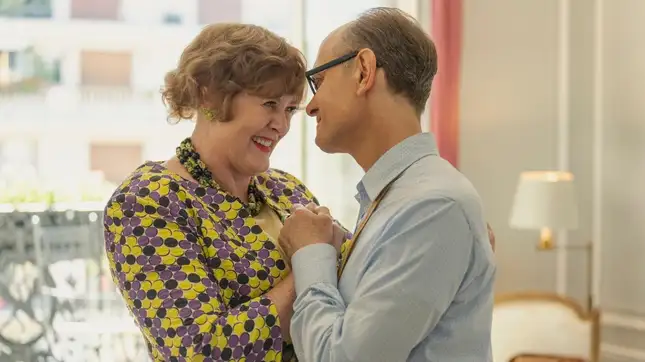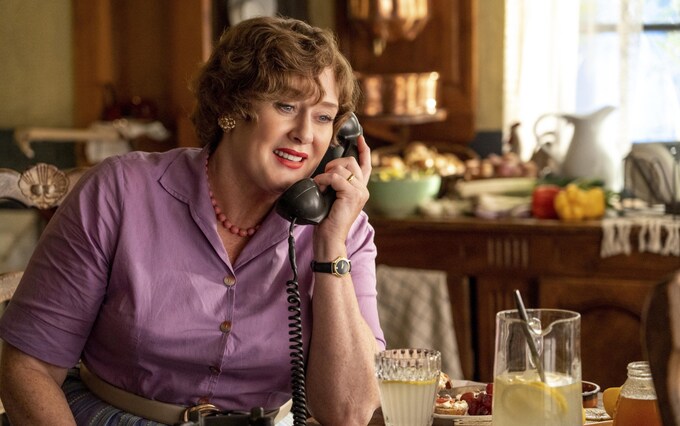Particularly for a well-liked public figure better known for her love of butter, her lofty height, or the way her iconically lilting voice would yodel around words like “boeuf bourguignon,” it was an unexpected character detail revealed in the first season of Max’s biographical dramedy on the celebrity chef and cookbook author who revolutionized the way the world eats. Yes, this was a lady we identify with hunger, but not with carnal hunger precisely.
Following the formula set by the first season, which debuted its first three episodes on November 16, the second season offers up plenty of scenes featuring Julia (Sarah Lancashire, still amazing) and her devoted husband Paul (David Hyde Pierce) in their element, whether it’s in a hotel in Paris or at their Cambridge, Massachusetts, home. This is a part of Child’s personality that is not easily found on her Wikipedia page or in other film portrayals of the culinary icon (the most well-known of which, aside from the chef’s own televised cooking lessons, is Meryl Streep’s Golden Globe-winning role in 2009’s Julie & Julia).
Julia Season 2 Review

With all of the primary characters dispersed around the show, the second season gets off to a slow start. On one side, Julia and Paul (played by the superb Sarah Lancashire and David Hyde Pierce) are unwinding at Simone Beck’s (Isabella Rossellini), co-author of Julia’s cookbook, French Estate. Because no one takes her seriously for being a woman, and a black woman at that, Alice (Brittany Bradford) struggles to sell her created “By Women, For Women” model to television while she is at home.
In another scene, Judith Jones (Fiona Glascott) puts on a brave face to play evil under constant pressure, and Hunter Fox (Robert Joy) needs another “The French Chef” triumph because everyone on the team is under pressure from above. from Blanche Knopf, his aging supervisor (Judith Light). And these are only a few of the people and storylines we will encounter this season.
There seems to be no clear direction for the first few episodes. In a clumsy culinary metaphor, the previous season threw all the ingredients into the pot and now the soup is just simmering; the vegetables are dancing in the water and something is changing inside of them that will eventually result in a delicious dish, but it’s not very fascinating to watch them cook.
Eventually, though, the narrative changes. After returning home, Mr. and Mrs. Child get to work on the set, where they begin filming dramas, the most significant of which is the FBI-related one. Because of her connections and power, Mrs. Child has drawn the notice of the Hoover agency, who have quite inelegantly asked her for assistance. The show’s creators even want to transport us to the White House in one episode! It’s intriguing to bring up this topic because I was unaware that the children had ever been spies.
Complex Emotions: Uplifting Endings in Varied Stories

The series has an exceptionally deep emotional layer. With how lovingly he talks about her and what a supporting soul he is, Julia and Paul’s amazing marriage is at its core. However, Julia has no obligation to him and, when his twin brother visits them, she aggressively defends him since she constantly needs to boost her confidence by bouncing off his brother.
The casting of the actor was a curiously successful endeavor. Other than these, the screenwriters give us a lot of other accounts, whether or not it is based on true events—this isn’t a documentary. Alice with her mother (Adriane Lenox); Judith with her supervisor; Alice with her significant other; Bebe Neuwirth’s Avis and… in her life; Julia and Simone, among others. Stories like these have heartwarming and uplifted endings that make you feel like there’s always something going on.
Everyone’s performance is just superb, however, I find that there is some stratification as a result of the enormous number of actors who are constantly changing. Even though the show is titled “Julia,” Mrs. Child is merely one of many parts in the puzzle, and much like the other primary characters, it is simple to appreciate her for any reason—whether she is a kind, kind person or, conversely, a sly tease who plays her part without being timid. game, it’s difficult to avoid feeling like you’re witnessing a soap opera.
Though in ten different residences, not much is happening. While a more somber, realistic plot would appeal to some, it would benefit from having a single overarching thread to give the audience the impression that the story was moving in a certain direction. It is said that we are filming the second season of “The French Chef” at this location; nevertheless, the show itself has not garnered much notice, and the eighth and last episode’s grand finale is entirely unrelated to the show.
Related:
Happy Valley Season 3 Review: Celebrating Crime Drama Excellence!
Billions Season 7 Review: Exploring the High-Stakes Financiers World
Summary
Not everyone will enjoy the “Julia” series. The entire enjoyment of viewing this performance, which is one of those where not much happens, comes from taking in the endearing and exquisitely portrayed characters and their triumphs, setbacks, and struggles. My mother was probably thrilled with it. Even at that point, the second season is more of an examination of the characters, political climate, and socioeconomic reality of those years than it is a gripping mystery that is hard to escape. The first part of the season takes a long time to settle in. Fans of strong acting and realistic emotions on screen should check it out.

